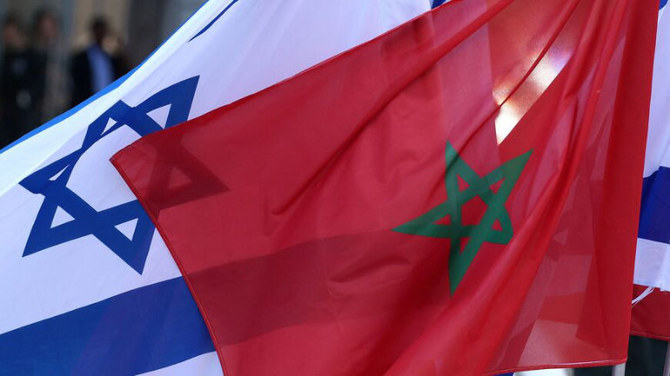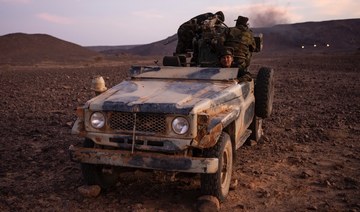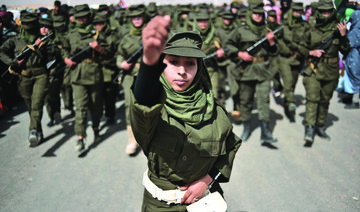RABAT: Israel has decided to “recognize Morocco’s sovereignty” over the disputed Western Sahara region, the royal office in Rabat announced Monday, citing a letter from the Israeli prime minister.
According to the letter, Benjamin Netanyahu informed Morocco’s King Mohammed VI of “the State of Israel’s decision to recognize Morocco’s sovereignty” over the mineral-rich desert region, the royal office said in a statement.
Netanyahu said in the letter that Israel is examining the “opening of a consulate in the town of Dakhla,” located in the Moroccan part of Western Sahara — a move long demanded by Rabat.
Israel confirmed the contents of the statement from Morocco when contacted by AFP.
Israeli Foreign Minister Eli Cohen said Netanyahu’s announcement would “strengthen the relations between the states and peoples, as well as the continued cooperation to enhance peace and regional stability.”
Amir Ohana, the speaker of the Israeli parliament, paid an official visit to Rabat in early June and said that his country “should move toward” recognizing Moroccan sovereignty over Western Sahara.
Ohana said “serious discussions” between the countries over the issue were underway and that Netanyahu “will be announcing his decisions in the near future.”
The Western Sahara dispute dates back to 1975, when colonial ruler Spain withdrew from the territory, sparking a 15-year war between Morocco and the Polisario Front movement seeking independence in the territory.
Rabat controls nearly 80 percent of Western Sahara and sees the entire region, home to abundant phosphates and fisheries, as its sovereign territory.
Rabat advocates for limited autonomy for the vast desert territory while the Algeria-backed Polisario seeks independence and has called for a UN-supervised referendum on self-determination, but it has never taken place.
Since late 2020, the Polisario says it has been in “a war of legitimate defense” and has declared the entire Western Sahara, including its land, sea and airspace, a “war zone.”
According to Monday’s statement from the royal office, Netanyahu’s letter said Israel’s decision would be transmitted to the United Nations, international organizations, and every country with which Israel has diplomatic relations.
Morocco and Israel normalized relations in December 2020 as part of a series of similar US-backed deals with Arab states known as the Abraham Accords.
In return for normalization with Israel, Rabat received from Washington recognition of Moroccan sovereignty over Western Sahara.
Israeli-Moroccan cooperation in security, trade and tourism has since grown.
But while politicians push for closer ties, sections of Morocco’s public are cautious of the presence of ultra-nationalists in Israel’s government, who are hostile to further talks with the Palestinians.
Israel’s decision to recognize Rabat’s sovereignty over Western Sahara comes at a time of heightened rivalry between Morocco and Algeria, after the two North African neighbors severed their diplomatic relations last summer.
Israel recognizes Moroccan sovereignty over Western Sahara
https://arab.news/yyr2f
Israel recognizes Moroccan sovereignty over Western Sahara

- Rabat controls nearly 80 percent of Western Sahara and sees the entire region, home to abundant phosphates and fisheries, as its sovereign territory
Aid groups warn of mounting challenges to Gaza operations

- The latest fighting, more than seven months into the war, has cut off access to some areas and left aid crossings either closed or operating at a limited capacity
“There are enormous needs” which are bound to grow, while there is “less and less access”, said the head of a European charity, speaking to AFP on condition of anonymity.
Aid groups say the humanitarian crisis in the war-ravaged Palestinian territory, where the UN has warned of looming famine, has significantly deteriorated since Israeli troops entered eastern Rafah last week.
The Israeli military has launched what it called a “limited” operation, seizing on May 7 the Rafah crossing on the Egyptian border — a key aid conduit that is now shut — and sparking an exodus of Palestinians seeking safety further north in Gaza.
The latest fighting, more than seven months into the war, has cut off access to some areas and left aid crossings either closed or operating at a limited capacity.
A worker for the Paris-based non-governmental organization Humanity & Inclusion (HI) in the Palestinian territories, also requesting anonymity, said: “We can’t get our teams out, the security conditions are too unstable.”
Israel has vowed to defeat remaining Hamas forces in the southern city of Rafah, which it says is the last bastion of the group whose October 7 attack triggered the war.
The attack on southern Israel resulted in the deaths of more than 1,170 people, mostly civilians, according to an AFP tally based on official Israeli figures.
Israel’s campaign in Gaza has since killed at least 35,303 people, also mostly civilians, according to data provided by the health ministry in the Hamas-run territory.
Aid workers told AFP their organizations had regularly been denied access by Israeli authorities to certain areas or routes.
The Kerem Shalom crossing between Israel and southern Gaza has reopened following a brief closure, but humanitarian groups say Israeli tanks amassing there and repeated Hamas rocket fire have hindered operations.
A trickle of aid has entered via Kerem Shalom in recent days under “great risk, through an area of active hostilities,” said a UN employee in Jerusalem.
Human Rights Watch charged this week that Israeli forces had repeatedly targeted known aid worker locations, even when their organizations had provided the coordinates to Israeli authorities to ensure their protection.
On Monday a UN employee was killed and another wounded when their vehicle was hit in Rafah.
Shaina Low, communications adviser for the Norwegian Refugee Council, said the organization had subsequently “canceled all of our movements for the rest of the day to mitigate risk to our staff.”
The Israeli army said it was looking into the incident which occurred “in an area declared an active combat zone.”
Since the war began, more than 250 humanitarian workers have been killed in Gaza, according to UN figures.
Aid workers complain of lengthy and convoluted procedures to coordinate their movements with the Israeli military via the United Nations and several Israeli agencies.
“We are seeing mishaps” even after COGAT, the Israeli defense ministry body overseeing civilian affairs in the occupied Palestinian territories, informs organizations they have clearance, said Tania Hary, head of Israeli rights group Gisha.
“It does point to something that’s going wrong in the communication” between COGAT and the army, she said.
To avoid having to go through a series of mediators — UN agencies, Israel’s Coordination and Liaison Administration and then its parent agency COGAT — some aid groups have opted for direct contact with Israeli military authorities.
But workers and officials told AFP this has mostly created further confusion. Some also fear NGOs would accept conditions in direct communication with the military, which could set precedents other groups may not be willing to abide by.
The HI employee said: “Notifying them of our movements, which they’re not supposed to hinder, is a way of reminding them of their accountability if anything goes wrong.”
Humanitarian workers stress that Israel, as an occupying power, is required under international law to ensure aid reaches civilians in Gaza.
A military spokesperson said Thursday the army was in contact with international organizations “in real time” and ensuring “the best way possible to communicate as fast as possible.”
Even if a full-scale invasion of Rafah is averted, humanitarian agencies say conditions are unsustainable.
Debris and destruction have rendered main routes and many other roads impassable, and a severe fuel shortage — worsened since the Rafah crossing takeover — has limited the use of vehicles.
“We’re only going to places we can walk to,” said the head of one aid group with about 50 workers in Gaza.
A Jerusalem-based humanitarian official, also speaking on condition of anonymity, said he recognized that “military imperatives” arise in conflicts and may limit aid operations.
But in the Gaza war, movement requests are denied too often and “we can hardly bring anything,” he said.
“We can’t work like this.”
Western nations urge Israel to comply with international law in Gaza

- Israel denies blocking humanitarian aid and says it needs to eliminate Hamas for its own protection
- The Western nations said they were opposed to “a full-scale military operation in Rafah” and called on Israel to let humanitarian aid reach the population
ROME: Israel must comply with international law in Gaza and address the devastating humanitarian crisis in the Palestinian enclave, a group of Western nations wrote in a letter to the Israeli government seen by Reuters on Friday.
All countries belonging to the Group of Seven (G7) major democracies, apart from the United States, signed the letter, along with Australia, South Korea, New Zealand, the Netherlands, Denmark, Sweden and Finland.
The five-page letter comes as Israeli forces bear down on the southern Gaza city of Rafah as part of its drive to eradicate Hamas, despite warnings this could result in mass casualties in an area where displaced civilians have found shelter.
“In exerting its right to defend itself, Israel must fully comply with international law, including international humanitarian law,” the letter said, reiterating “outrage” for the Oct. 7 Hamas raid into Israel which triggered the conflict.
Israel denies blocking humanitarian aid and says it needs to eliminate Hamas for its own protection.
The Western nations said they were opposed to “a full-scale military operation in Rafah” and called on Israel to let humanitarian aid reach the population “through all relevant crossing points, including the one in Rafah.”
“According to UN estimates, an intensified military offensive would affect approximately 1.4 million people,” the letter said, underscoring the need “for specific, concrete and measurable steps” to significantly boost the flow of aid.
The letter recognizes Israel made progress in addressing a number of issues, including letting more aid trucks into the Gaza Strip, the reopening of the Erez crossing into northern Gaza and the temporary use of Ashdod port in southern Israel.
But it called on Prime Minister Benjamin Netanyahu’s government to do more, including working toward a “sustainable ceasefire,” facilitating further evacuations and resuming “electricity, water and telecommunication services.”
Since Oct. 7 Israel’s Gaza offensive has killed more than 35,000 Palestinians, local health officials say.
Gaza fighting rages after Israel vows to intensify Rafah offensive

- Fierce battles overnight in and around the Jabalia refugee camp in the north of the war-ravaged Gaza Strip
- Israeli warships launched strikes on Rafah, on the border with Egypt
RAFAH: Fighting raged Friday in Gaza after Israel vowed to intensify its ground offensive in Rafah despite international concerns for the hundreds of thousands of displaced Palestinians in the southern city.
With Gazans facing hunger, the US military said “trucks carrying humanitarian assistance began moving ashore via a temporary pier” it set up to aid Palestinians in the besieged territory.
Witnesses reported fierce battles overnight in and around the Jabalia refugee camp in the north of the war-ravaged Gaza Strip.
Israeli helicopters carried out heavy strikes around Jabalia while army artillery hit homes near Kamal Adwan hospital in the camp, they said.
The bodies of six people were retrieved and several wounded people were evacuated after an air strike targeted a house in Jabalia, Gaza’s Civil Defense agency said.
Rescue teams were trying to recover people from under the rubble of the Shaaban family home on Al-Faluja Street in the camp, it added.
Witnesses said Israeli warships launched strikes on Rafah, on the border with Egypt, where more than 1.4 million Palestinian civilians have been sheltering.
Hamas’s armed wing, the Ezzedine Al-Qassam Brigades, said in a statement that it “targeted enemy forces stationed inside the Rafah border crossing... with mortar shells.”
The war broke out after the October 7 attack on southern Israel which resulted in the deaths of more than 1,170 people, mostly civilians, according to an AFP tally of Israeli official figures.
Out of 252 people taken hostage that day, 128 are still being held inside Gaza, including 38 who the army says are dead.
Israel vowed in response to crush Hamas and launched a military offensive on Gaza, where at least 35,303 people have been killed since the war erupted, according to data provided by the health ministry of Hamas-run territory.
Intensified ground operations
Israel has vowed to “intensify” its ground offensive in Rafah, in defiance of global warnings over the fate of Palestinians sheltering there.
Israel’s top ally the United States has joined other major powers in appealing for it to hold back from a full ground offensive in Rafah.
But Israeli Defense Minister Yoav Gallant on Thursday said “additional forces will enter” the Rafah area and “this activity will intensify.”
Prime Minister Benjamin Netanyahu insisted Thursday that the ground assault on Rafah was a “critical” part of the army’s mission to destroy Hamas and prevent any repetition of the October 7 attack.
“The battle in Rafah is critical... It’s not just the rest of their battalions, it’s also like an oxygen line for them for escape and resupply,” he said.
The Israeli siege of Gaza has brought dire shortages of food as well as safe water, medicines and fuel for its 2.4 million people.
The arrival of occasional aid convoys has slowed to a trickle since Israeli forces took control last week of the Gaza side of the Rafah crossing.
UN denounces ‘intimidation and harassment’ of lawyers in Tunisia

- Civil society in the North African country condemned the arrests as a crackdown on dissent in the country
- The European Union expressed concern this week over the arrests
GENEVA: The United Nations on Friday denounced recent arrests of lawyers in Tunisia, saying the detentions, which have also included journalists and political commentators, undermined the rule of law in the North Africa country.
“Reported raids in the past week on the Tunisia Bar Association undermine the rule of law and violate international standards on the protection of the independence and function of lawyers,” Ravina Shamdasani, spokeswoman for the Office for the Coordination of Humanitarian Affairs (OCHA), told reporters in Geneva.
“Such actions constitute forms of intimidation and harassment.”
The arrests have sparked condemnations by Tunisia’s civil society and have sparked an international backlash, which Tunisia’s President Kais Saied has slammed as foreign “interference.”
Civil society in the North African country condemned the arrests as a crackdown on dissent in the country that saw the onset of the Arab Spring.
The European Union expressed concern this week over the arrests, while the United States said they contradicted the universal rights guaranteed by the country’s constitution.
Saied, who seized sweeping powers in 2021, on Thursday ordered the foreign ministry to summon ambassadors of several countries and inform them that “Tunisia is an independent state,” in a video released by his office.
Israel strikes on Lebanon kill three, says source close to Hezbollah

- Israeli strikes targeted Najjariyeh and Addousiyeh
- The NNA reported “victims” without elaborating
BEIRUT: Israeli air strikes on Friday hit an area of southern Lebanon far from the border, Lebanese official media said, with a source close to Hezbollah reporting three dead including two Syrian nationals.
The Iran-backed armed group, a Hamas ally, has traded cross-border fire with Israeli forces almost daily since the Palestinian group’s October 7 attack on southern Israel that sparked the war in Gaza, now in its eighth month.
Lebanon’s state-run National News Agency said “Israeli strikes targeted Najjariyeh and Addousiyeh,” two adjacent villages about 30 kilometers (19 miles) from the Israeli border just south of the coastal city of Sidon.
The NNA reported “victims” without elaborating.
A source close to Hezbollah told AFP that three people were killed in Najjariyeh — two Syrians and a Lebanese man.
An AFP photographer saw ambulances heading to the targeted sites, saying the strikes hit a pickup truck in Najjariyeh and an orchard.
Hezbollah — which has escalated its cross-border attacks in recent days, prompting Israeli strikes deeper into Lebanese territory — announced Friday it had launched “attack drones” on Israeli military positions.
It came a day after the powerful Lebanese group said it had attacked an army position in Metula, a border town in northern Israel, wounding three soldiers.
Hezbollah said the attack was carried out with an “attack drone carrying two S5 rockets,” which are normally launched from jets.
Also on Thursday the group announced the deaths of two of its fighters in Israeli strikes on southern Lebanon. The NNA said they were killed when their car was targeted.
Hezbollah earlier on Thursday said it had launched dozens of Katyusha rockets at Israeli positions in the annexed Golan Heights.
Israel retaliated with overnight air raids on Lebanon’s eastern Baalbek region, a Hezbollah stronghold near the Syrian border.
Earlier this week Hezbollah said it had targeted an Israeli base near Tiberias, about 30 kilometers from the Lebanese border — one of the group’s deepest attacks into Israeli territory since clashes began on October 8.
The Wednesday strike came a day after the death of a Hezbollah member, which Israel said was a field commander, in an attack on southern Lebanon.
The cross-border fighting has killed at least 418 people in Lebanon, mostly militants but also including 80 civilians, according to an AFP tally.
Israel says 14 soldiers and 10 civilians have been killed on its side of the border.



















